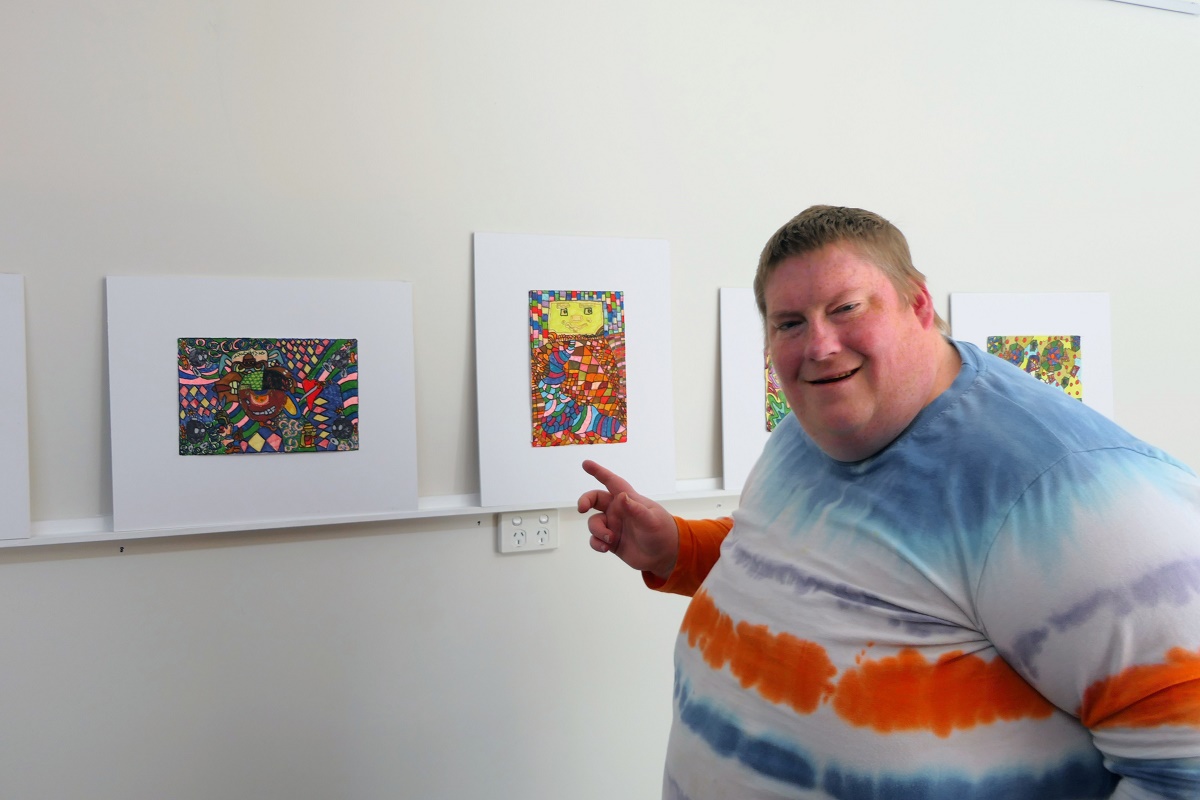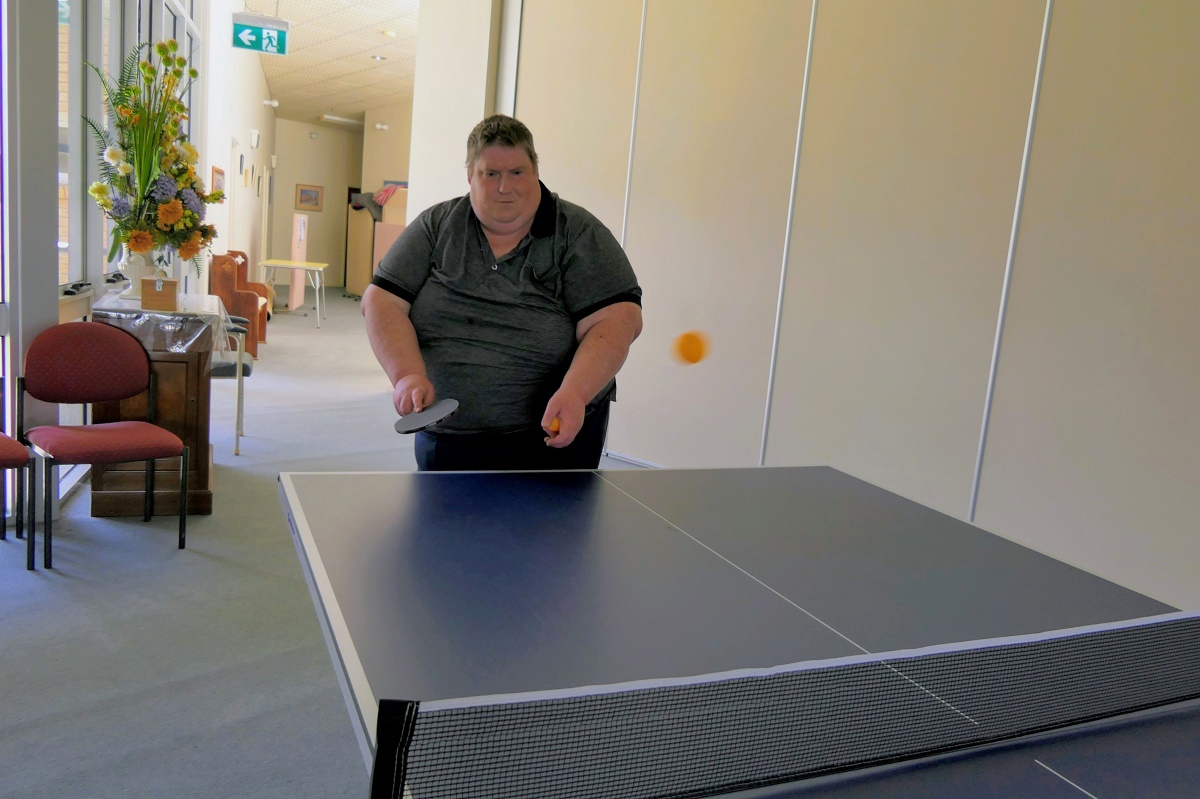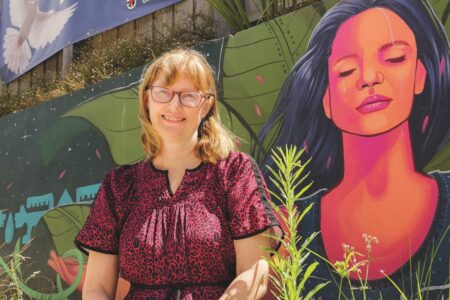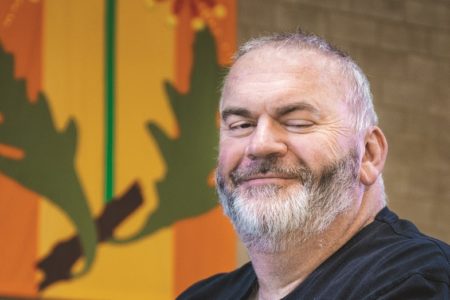By Andrew Humphries
In November last year, Horsham UC member Jonathan Sehoolderman’s artistic talent went on show with an exhibition of his work.
The exhibition proved to be one of the high points of what had otherwise been a forgettable 18 months for the Dimboola resident.
In fact, if it wasn’t for the outlet provided by his art, Jonathan isn’t sure how he might have coped with what he has been through.
Jonathan has Prader-Willi Syndrome, a rare genetic disorder that results in a number of physical, mental and behavioural problems.
One of those is that he always feels hungry and eats continually.
It has led to type 2 diabetes and other health issues which have resulted in almost permanent stays in a number of hospitals in western Victoria.
Jonathan’s health problems mean he requires accommodation involving 24-hour supervision, yet the sad reality is that such a place has been difficult to find, and he is one of many people forced to wait for National Disability Insurance Scheme funding for housing and support.
It’s a situation, says Synod Justice and International Mission cluster social justice officer Tim Molineux, that simply shouldn’t be the case in a country like Australia, and is the sole fault of the National Disability Insurance Agency, which has the job of administering the NDIS.
“It’s almost becoming a running joke, in terms of how easily this is fixable, and the resources that are available to fix it, versus the apparent inability of the NDIA to actually do that,” Tim says.
“At the moment there are about 3000 vacancies in disability housing and it’s the NDIA’s responsibility to manage getting people into these vacancies.
“At the same time, they are only spending 27 per cent of the $700 million budget they have for specialist disability accommodation, so there is massive inefficiency within the NDIA preventing it from administering its funds and responsibilities correctly.”
With all of this in mind, JIM, with help from the Summer Foundation, has started a campaign called Down to 10 days, which aims to get NDIS participants the housing and support they need as soon as possible.
The campaign calls on the NDIA to make housing and support decisions within 10 days from the application by the person with a disability.
“The delays in access to specialist disability accommodation and supported decision-making pose severe risks to the health and wellbeing of NDIS participants,” Tim says.
According to Tim, of more than 2000 people on the NDIS in hospital, over half are medically ready to be discharged but do not have an appropriate support system and accommodation in place.
“Around 30 per cent of those in hospital are waiting for the NDIA to process their application for support,” he says.

Jonathan Sehoolderman with some of his art which featured in a recent exhibition.
Tim says bureaucratic red tape is the main issue.
“The NDIA reported there were 3000 vacancies in disability housing across Australia (but) the processing time of the NDIA for accommodation applications appears to be the main barrier to getting people with a disability into housing,” he says.
Recent reports suggest that some disability patients in Victoria spend as long as 20 months waiting for discharge and that on any day, between 100 and 300 people with a disability are occupying a Victorian hospital bed despite being ready to be discharged.
“People who have been waiting for more than two years are starting to see fair decisions about housing and support, yet there is still much to do,” Tim says.
For Jonathan, who Crosslight spoke to late last year, much of 2021 and 2022 have been a nightmare involving shifting from hospital to hospital, with short stays in accommodation that has been unsuitable, meaning Horsham hospital has been his “home” for an extended period of time.
His troubles began in August 2021 when he was found unconscious at home and taken to Horsham hospital, before being transferred to Ballarat hospital’s intensive care unit, his life hanging in the balance.
Tests showed Jonathan had developed type 2 diabetes and his treatment continued as he was transferred back to Horsham hospital.
In October, he was transferred to his home town hospital, which proved a stressful experience as he was in a ward with a number of dementia patients.
“I was almost suicidal at one point because it was causing me so much grief,” Jonathan says.
In February he returned to Horsham hospital, the beginning of his lengthy stay there.
During that time, a number of planned accommodation options fell through, adding to a growing sense of despair for Jonathan.
It was, understandably, a frustrating experience for someone who just wanted to leave hospital and move into suitable accommodation where he could be looked after properly.
“It’s been a very upsetting experience,” Jonathan says.
“Sometimes my mood is good, other times it definitely isn’t, and it’s been incredibly frustrating.”
One of the only bright lights, he admits, is his love of art.
“I enjoy painting and drawing and that’s what keeps me going,” he says.

“My faith is very important in helping me to deal with everything that is happening to me,” says Jonathan Sehoolderman.
Also important is his faith and the joy he derives from being part of the Horsham UC congregation.
Despite his health issues, Jonathan is able to attend the Sunday service, describing it as an important part of his week.
“I attend every Sunday, I’m in the choir, and I also attend Messy Church,” he says.
“My faith is very important in helping me to deal with everything that is happening to me.”
So what exactly can Uniting Church members do to improve the situation for people like Jonathan?
Tim says the issue is one that should resonate with UC members everywhere, given it is one based on the concept of a fair go for all.
“As UC members we need to look at this as an issue around how we care for others in society, and how we are called to be Christians,” he says.
“What we can do is as important as the reason as to why we do it, and the Church can also use its voice as an organisation that is invested in this space.
“There is a legitimacy for us as a Church to be meeting in this space and hearing what our own experts are saying.”
Pressure brought to bear on Minister Bill Shorten, who is responsible for the NDIS, through a letter-writing campaign is an important part of publicising the issue, Tim says.
“As a member of the Down to 10 days alliance, we need your support,” he says.
“There are close to 150 organisations backing the campaign, and together we can drive reform.
“We ask that you write to Mr Shorten reiterating that the alliance seeks a commitment from the
Commonwealth Government for faster, more accurate decisions on housing and supports for people with a disability.
“Here we have a situation where people are being completely ignored within a system that is supposed to be caring for them, and they are powerless and have to wait and wait for accommodation.
“We have people here who are disempowered and powerless because the system doesn’t allow them to participate by addressing their needs.
“They’re not being allowed to speak up and that’s why we as a Church can be advocates within that space.”
Letters should be addressed to The Hon Bill Shorten MP, Minister for the National Disability Insurance Scheme, PO Box 6022, House of Representatives, Parliament House, Canberra ACT 2600.




